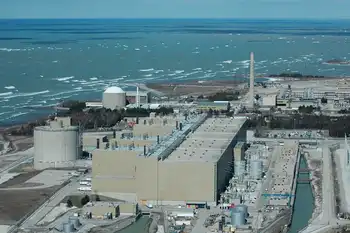Despite PSC refusal, officials vow LIPA review
MELVILLE, NEW YORK - The state Public Service Commission's refusal to review the Long Island Power Authority's controversial surcharges and executive pay has ignited a firestorm of criticism and provided wind for legislative and legal efforts to rein in the utility and spiraling electric bills.
Saying he was "flabbergasted" by the PSC's "punting of the ball," Suffolk County Executive Steve Levy said that he's revisiting an earlier threat of a lawsuit to get to the bottom of LIPA surcharges.
"We are evaluating right now our ability to bring litigation to force the Public Service Commission to do its job," he said. "We can't have utilities setting their own rates without any type of oversight."
In the State Assembly, meanwhile, a proposal that would force a regulatory review of the surcharges sailed through last week after months of inaction.
"The heat is on, and we're going to keep the heat on," said State Assemb. Patricia Eddington (D-Medford), who sponsored the bill, which lacks a Senate sponsor and would require the governor's signature.
LIPA's surcharges have been in the spotlight since they began to spike last year, which LIPA attributed to soaring fuel costs. LIPA maintains it is undercharging customers but agreed to a PSC review after Levy threatened a lawsuit and ratepayers filed a class action earlier this year.
In declining to conduct the review, the PSC said it lacked jurisdiction. Instead, it proposed overseeing a review by an independent company, which LIPA said it will accept. Eddington expressed outrage.
"The PSC even had the gall to say that they'd help LIPA find a consultant, so now the ratepayers will have to bear the burden of another cost," she said. A PSC spokeswoman declined to comment, referring a reporter to a release that says, in part, "LIPA is generally exempt from the Commission's jurisdiction and LIPA's practices are not governed by, and need not comply with, the provisions of the Public Service Law."
Although the PSC won't conduct the review, one other state agency may entertain the work. Asked last week if he'd allow State Comptroller Alan Hevesi's office to conduct it, LIPA chairman Richard Kessel pondered it. "If the comptroller wanted to do that versus an outside entity? That's fine. I don't care."
Jeffrey Gordon, a spokesman for Hevesi, said: "We believe it's an interesting idea, and certainly we're interested in talking to Mr. Kessel about it."
Sen. Charles Schumer (D-New York) also took sharp aim recently. "The P in PSC stands for public, and instead of representing electric companies it should represent the public," he said. "LIPA was created to reduce, not increase, the cost of power on Long Island, and Long Island's ratepayers deserve to know with certainty whether the fuel surcharges that are added to their bills each year are fully justified."
Kessel said an independent review is the proper way to show the utility has done nothing improper in levying surcharges and estimated the process could take six months and cost $1 million.
"Whatever the State Legislature enacts, we'll follow," he said. "I have no fear of oversight." He charged that "some of the people who are complaining just don't like the fact that they didn't get the answer they wanted" from the PSC.
But the complaints go beyond that.
Assemb. Marc Alessi (D-Manor Park), a frequent LIPA critic who worked in Hevesi's office, said the PSC's decision highlights the need for alternatives to rein in LIPA. He was among Long Island legislators who criticized the manner in which LIPA framed the review request, saying it left the PSC few alternatives but to reject it.
"It's obvious that as a state legislator I need to amend that law to ensure that LIPA is more accountable to the ratepayers," Alessi said last week in an e-mail message. "I have been fighting to change the way LIPA does business...."
Alessi suggested that LIPA may have outgrown its original mandate. "LIPA was created to monitor the Long Island energy market," he said "Now the monitor needs monitoring, and that is shameful. This PSC ruling proves that LIPA is less accountable to the public than its predecessor LILCO was."
Despite the PSC's decision granting LIPA a declaratory ruling that agency regulations don't specify what LIPA can recover through "adjustment clauses" such as its surcharge, a law firm leading the battle against LIPA in court said the PSC's decision only strengthens its case.
"LIPA's attempts to circumvent the jurisdiction of the Supreme Court and to avoid the allegations of ratepayers have been roundly rejected," said Jerry Silk, partner at the firm Bernstein Litowitz Berger & Grossman. "While any willingness by LIPA to open its books to a complete and full outside review would be welcome, such a review cannot remedy the financial harm caused to ratepayers since these improper surcharges were first levied in 2001."
Related News

Bruce nuclear reactor taken offline as $2.1B project 'officially' begins
TIVERTON, ONT - The world’s largest nuclear fleet, became a little smaller Monday morning. Bruce Power has began the process to take Unit 6 offline to begin a $2.1 billion project to replace all the major components of the reactor.
The reactor, which produces enough electricity to power 750,000 homes, will be out of service for the next four years.
In its place, hydroelectric power and natural gas will be utilized more.
Taking Unit 6 offline is just the “official” beginning of a 13-year, $13-billion project to refurbish six of Bruce Power’s eight nuclear reactors.
Work to extend the life of the nuclear plant…




